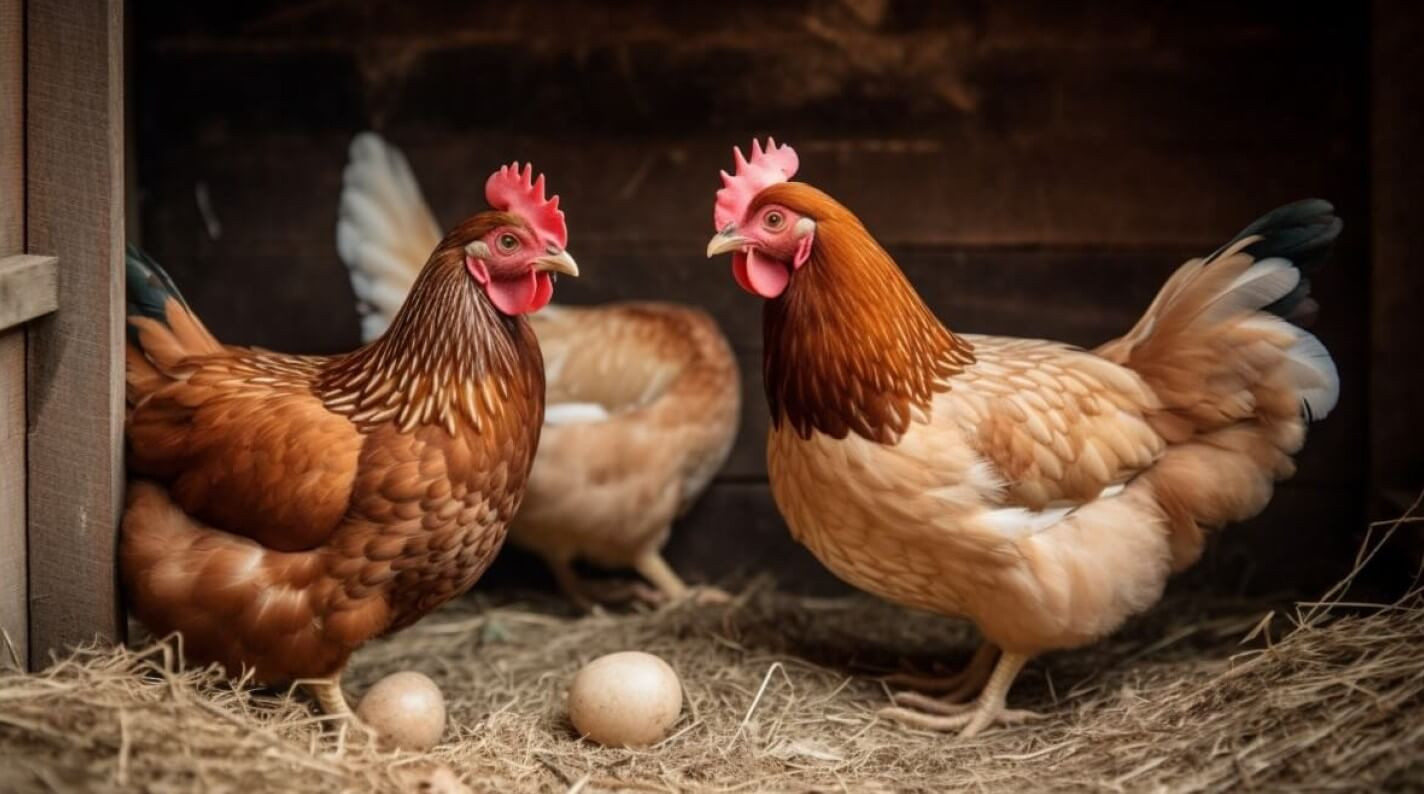Introduction
Would you prefer to listen to a short podcast discussion about this article? Click on the audio below.
When it comes to choosing healthy hens to buy, there are some things that you need to keep in mind. Whether you’re starting your own backyard flock or looking to add to an existing one, selecting hens that are in good health to ensure optimal egg production and overall well-being for your feathered friends is crucial. Here’s how to identify and choose healthy hens to buy.
Table of Contents
First and foremost, it’s essential to inspect each bird carefully. Look for signs of a healthy chicken, re illness or injury, such as listlessness, droopy wings, or discolouration of the comb or wattles. Check their feathers to ensure they’re clean, smooth, and free of matted clumps. Please pay attention to their eyes, which should be bright and clear, and their beaks, which should be straight and not overly long or crooked.

Choosing Healthy Hens – Key Factors
Another key factor to consider is the bird’s age. While older hens may still produce eggs, their egg-laying capacity will diminish over time. On the other hand, very young birds may take longer to start laying, so it’s best to buy birds that are at least 16 to 20 weeks old. This is typically the age when most hens will begin to lay their first eggs.
When selecting hens, it’s also important to consider their breed, especially if you haven’t kept chickens before, look for the best chickens for beginners. Different breeds have varying temperaments, sizes, and egg-laying capacities. Some species, such as Rhode Island Reds and Leghorns, are known for their prolific egg-laying, while others, such as Silkies and Cochins, are more decorative in nature. Assess your needs and preferences, and choose a breed that will suit your purpose.
When choosing healthy chickens and before purchasing your flock, ask the seller pertinent questions about the birds’ history and environment. For example, find out if they’ve been vaccinated against common poultry diseases, such as Marek’s and Newcastle. Also, ask about their diet and living conditions, such as whether they’ve been allowed to free-range or if they’ve been kept in small, crowded spaces. Healthy hens should have access to clean water, a balanced diet of grains and proteins, and plenty of exercise. After all, it is all about keeping happy healthy hens.
IMPORTANT:
To avoid tears, you must make your hens compound as secure as you can to keep out foxes and vermin. This means digging the chicken run fencing etc., deep into the ground to prevent burrowing by predators. There is nothing worse than waking up to a hen house full of chickens that have been torn apart by a fox or having all your eggs carried away by rats.

Choosing Healthy Hens – Settling in
Finally, make sure to transport your new hens carefully in a secure and comfortable carrier. To raise them properly, keep them warm and dry, and avoid stressing them out with loud noises, sudden movements, or extreme temperatures. Once you have arrived home, gradually introduce your new hens to their new environment, giving them time to adjust to their new surroundings before exposing them to other birds.
In conclusion, choosing healthy hens requires a keen eye and attention to detail. Inspect each bird carefully, consider their breed and age, ask questions about their history and environment, and transport them carefully. With these tips in mind, you’ll be able to select hens that are not only healthy but also happy and productive members of your backyard flock.
If you require any assistance with this article, please do not hesitate to Contact Us
Choosing Healthy Hens – Avian Flu
Choosing Healthy Hens – FAQs
How do you pick a healthy hen?
When picking a healthy chicken, here are some things to look for: – Energetic and alert behaviour – Clean feathers and bright, clear eyes – No signs of injury or illness such as discharge from the eyes or nostrils – Good weight and stance (not too thin or too overweight, and standing upright) – A healthy-looking comb and wattles It’s also good to observe the general condition of the flock, as any signs of illness or disease in one chicken could spread to the others.
How do you know if a hen is unhealthy?
Here are some signs that a hen may be unhealthy: – Lethargic behaviour and decreased activity level – Sulky or listless appearance, with hunched or fluffed feathers – Discharge from the eyes or nostrils – Runny or discoloured droppings – Loss of appetite or diminished food and water intake – Abnormal or difficult breathing – Signs of injury or feather loss – Abnormal growths or swellings It’s important to keep a close eye on your flock and monitor them regularly for any changes in behaviour, appearance, or health. If you suspect a hen may be unhealthy, it’s best to consult with a veterinarian who can provide a proper diagnosis and treatment.
Raising hens for meat – how do you know if a chicken is healthy to eat?
When considering whether a chicken is healthy to eat, here are some factors to consider: – The age of the chicken: Younger chickens are more tender and milder in flavour, while older chickens may be tougher and stronger in taste. – The chicken’s freshness: Make sure it is properly stored and has not reached its expiration date – Overall appearance and smell: The chicken should appear moist, plump, and not slimy or discoloured. It should also have a fresh aroma, not a foul or rancid smell. – Proper cooking: Cooking the chicken to the correct internal temperature (165°F or 74°C) is important to ensure any harmful bacteria are killed that may cause food-borne illness. It’s important to handle and prepare chicken with care to prevent illness. When in doubt, it’s always best to consult with a food safety expert or healthcare professional.
What are the drawbacks of keeping chickens?
While there are many benefits to keeping chickens, there are also some potential drawbacks. Here are a few: –
Space: Chickens require a fair amount of space for their coop, roaming, and foraging in a run or yard. –
Mess: Coops and nesting boxes need to be cleaned regularly to prevent the buildup of droppings and odours. Chickens can also be messy eaters and scatter feed and water outside their designated areas. This will entice rats and mice.
Expense: The initial investment in a coop, feeders, waterers, and other supplies can be expensive, and ongoing expenses for feed, bedding, and healthcare should also be considered. –
Predators: Chickens can be vulnerable to predators such as foxes and hawks. Proper fencing and security measures are important to keep them safe from harm. It’s important to weigh these potential drawbacks against the benefits of keeping chickens and to make sure you have the space, time, and financial resources needed to care for them properly.
For more information, visit The British Poultry Council




















